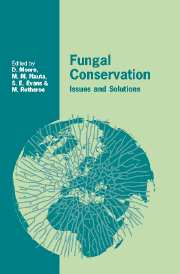Book contents
- Frontmatter
- Contents
- List of contributors
- Preface
- 1 Fungal conservation issues: recognising the problem, finding solutions
- 2 Current trends and perspectives for the global conservation of fungi
- 3 Conservation and management of forest fungi in the Pacific Northwestern United States: an integrated ecosystem approach
- 4 The future of fungi in Europe: threats, conservation and management
- 5 Fungi as indicators of primeval and old-growth forests deserving protection
- 6 Recognising and managing mycologically valuable sites in The Netherlands
- 7 Threats to hypogeous fungi
- 8 Wild mushrooms and rural economies
- 9 Threats to biodiversity caused by traditional mushroom cultivation technology in China
- 10 A preliminary survey of waxcap grassland indicator species in South Wales
- 11 Grasslands in the coastal dunes: the effect of nature management on the mycota
- 12 The conservation of fungi on reserves managed by the Royal Society for the Protection of Birds (RSPB)
- 13 Strategies for conservation of fungi in the Madonie Park, North Sicily
- 14 Fungal conservation in Ukraine
- 15 The threatened and near-threatened Aphyllophorales of Finland
- 16 Fungal conservation in Cuba
- 17 Microfungus diversity and the conservation agenda in Kenya
- 18 Fungi and the UK Biodiversity Action Plan: the process explained
- 19 The Scottish Wild Mushroom Forum
- 20 The contribution of national mycological societies: establishing a British Mycological Society policy
- 21 The contribution of national mycological societies: the Dutch Mycological Society and its Committee for Fungi and Nature Conservation
- 22 Fungal conservation in the 21st century: optimism and pessimism for the future
- Index
8 - Wild mushrooms and rural economies
Published online by Cambridge University Press: 13 October 2009
- Frontmatter
- Contents
- List of contributors
- Preface
- 1 Fungal conservation issues: recognising the problem, finding solutions
- 2 Current trends and perspectives for the global conservation of fungi
- 3 Conservation and management of forest fungi in the Pacific Northwestern United States: an integrated ecosystem approach
- 4 The future of fungi in Europe: threats, conservation and management
- 5 Fungi as indicators of primeval and old-growth forests deserving protection
- 6 Recognising and managing mycologically valuable sites in The Netherlands
- 7 Threats to hypogeous fungi
- 8 Wild mushrooms and rural economies
- 9 Threats to biodiversity caused by traditional mushroom cultivation technology in China
- 10 A preliminary survey of waxcap grassland indicator species in South Wales
- 11 Grasslands in the coastal dunes: the effect of nature management on the mycota
- 12 The conservation of fungi on reserves managed by the Royal Society for the Protection of Birds (RSPB)
- 13 Strategies for conservation of fungi in the Madonie Park, North Sicily
- 14 Fungal conservation in Ukraine
- 15 The threatened and near-threatened Aphyllophorales of Finland
- 16 Fungal conservation in Cuba
- 17 Microfungus diversity and the conservation agenda in Kenya
- 18 Fungi and the UK Biodiversity Action Plan: the process explained
- 19 The Scottish Wild Mushroom Forum
- 20 The contribution of national mycological societies: establishing a British Mycological Society policy
- 21 The contribution of national mycological societies: the Dutch Mycological Society and its Committee for Fungi and Nature Conservation
- 22 Fungal conservation in the 21st century: optimism and pessimism for the future
- Index
Summary
Introduction
Wild mushrooms have been praised by Roman and Chinese emperors alike while providing an important everyday food source for rural people around the world. But in America and other English-speaking countries, a deep and exaggerated distrust of mushrooms has denied them a cherished place at the dinner table. As Stephen Jay Gould has pointed out (Gould, 1997), this prejudice is expressed even in our everyday language: urban crime and taxes are said to ‘mushroom’ while prosperity and the arts ‘flower’!
Until recently very few Americans dared to eat wild mushrooms, and even fewer picked them. But in the 1980s, rising demand in the wealthier mushroom-loving countries caused them to look abroad for new sources of wild mushrooms. At the same time, Americans’ palates grew bolder and more sophisticated. Entrepreneurs rushed in to fill the rapidly growing demand for gourmet foods, and out-of-work rural Americans and recent immigrants (particularly from southeast Asia) saw picking wild mushrooms as a chance to make a decent living in a familiar environment, the forest, while maintaining a measure of personal dignity and cultural autonomy.
Thousands of people in the Pacific Northwest now pick and sell wild mushrooms. Most of them pick locally or opportunistically for a little extra cash or as one of several seasonally based strategies for survival.
- Type
- Chapter
- Information
- Fungal ConservationIssues and Solutions, pp. 105 - 110Publisher: Cambridge University PressPrint publication year: 2001
- 1
- Cited by



